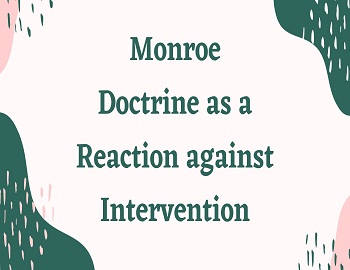Monroe Doctrine as a Reaction against Intervention:
According to Oppenheim, “Monroe doctrine is largely of a political, and not legal character”. The doctrine represents the political aspect of intervention as distinct from the legal aspect as stated above. The doctrine at its first appearance was indirectly a product of the policy of intervention in the interest of legitimacy which the Holy Alliance pursued at the beginning of the 19th century after the downfall of Napoleon. The Powers of this Alliance was inclined to extend their policy of intervention to America and to assist Spain in regaining her hold over the former Spanish Colonies in South America, which had declared and maintained their independence, and which were recognised as independent sovereign States by the United States of America. To meet and to check the imminent danger, President Monroe delivered his celebrated message to Congress on December 2, 1823. This message contains three important declarations-
(1) A declaration that the American Continent would no longer be a subject for colonization by a European Power.
(2) A declaration of absence of interest in European Wars or European affairs.
(3) A declaration that intervention by European Powers in the independence of the new South American Republics would be regarded as an unfriendly act.
The doctrine demanded non-intervention by European Powers in the independence of the new South American Republics and urged that the U.S.A., would consider any such attempt on their part as dangerous to its peace and security. President Grant re-iterated in 1870 that in future no territory on the American Continent would be liable to transfer to any European Power.
Throughout the rest of the 19th century, the Monroe Doctrine continued to be regarded by the United States as a bulwark of national defence, although a number of the applications of the doctrine appeared to other States to have a somewhat remote connection with the original purpose of the doctrine. The most direct challenge came from France in 1863 when an attempt was made by Lious Napoleon to impose a monarchial government upon Mexico. Spain challenged the Doctrine by annexing Santo Domingo in 1861 and by threats against the territorial integrity of Peru. In each case, the challenge was successfully met. Great Britain was believed to be challenging the Doctrine in 1895 by refusing to arbitrate a boundary dispute with Venezuela, and the American Secretary of State was led to make the bold assertion that “the United States is practically sovereign on this continent and its fiat is law upon the subjects to which it confines its interposition.
During the later part of the 19th century, Monroe Doctrine which was against intervention became a basis of intervention. The United States claimed to intervene in any part of the American Continent subject to a threat of intervention from any European Power or wherever in such continent vital interests of United States were endangered. Thus a doctrine that was originally directed against intervention was converted into one which justified intervention. However, after First World War America’s “good neighbour” policy towards the other American States brought the Monroe Doctrine closer to its former objective of 1823. And now because of inter-American security arrangements, the original doctrine has been transformed from unilateral declaration into a collective understanding of the American Powers.









Comments (No)